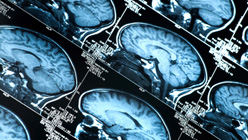The American Psychiatric Association voted this weekend to remove the diagnosis of Asperger’s syndrome from the so-called bible of psychiatry, the Diagnostic and Statistical Manual of Psychiatric Disorders. People with Asperger’s will now more likely be diagnosed as having autism spectrum disorder. The APA says the change will lead to more accurate diagnoses for people with autism — but critics say removing the diagnosis may result in fewer people getting the services and care they need.
Show Highlights
On The Two Main Issues With Removing the Asperger's Diagnosis:
There's identity politics and concerns about stigma on one hand, and concerns about people who might lose that diagnosis on the autism spectrum altogether and possibly lose services. And as far as stigma, I think that there are some groups and individuals who may think that there's something superior about either the Asperger's diagnosis or people who are diagnosed with it and create some separatism.
-Steven Kapp
On Why Some People Don't Care About the Change:
A lot of people who have Asperger's self-identify as autistic, period. So from that perspective, they don't really see a problem with sort of making this an umbrella situation.
-Emily Willingham
On Not Wanting to Give Up the Asperger's Diagnosis
A lot of people saw some logic to making the change, [but] some people really were reluctant to give up the word "Asperger's" in their life, they really sort of absorbed it into a lot of their identity.
-Michael John Carley
On Asperger's Being an Invalid Diagnosis:
The autism spectrum can be diagnosed pretty accurately when taken as a whole, but Asperger's — there's no validity to trying to cut up the autism spectrum, to creating sub-types or sub-diagnoses, despite so many different studies and efforts by scientists. So Asperger's is an invalid diagnosis, both in its design and practice. Many people get diagnosed with it who meet criteria for Autistic Disorder, and which diagnosis people get within the autism spectrum has a lot to do with unscientific factors like which clinic they go to, or where they live, or many other very problematic things. In California and many other states, people are denied services because they have an Asperger's, rather than Autistic Disorder Diagnosis, not for their individual needs.
-Steven Kapp
On Why People Are Attached to Separate Diagnoses:
We're human beings. We really like to compartmentalize. We have a really hard time swallowing the idea that all these famous people being diagnosed in retrospect, like Albert Einstein, Beethoven, Emily Dickinson, could possibly have just shades of the same condition as somebody who might not talk and lives in a home somewhere.
-Michael John Carley
How the Change Could Help Remove the Stigma of Autism
A lot of us forget, I think, that the word "Asperger's" had really negative stigma around 12 years ago when my son and I were diagnosed. Because we've changed as a society, and not because the condition changed, there's a lot more positive that's summoned when you immediately think of that word in your head than you would have 12 years ago. And I think that if everybody is diagnosed with autism, that actually that's something that's going to happen for the word autism later on in life as well.
-Michael John Carley
On How the Change Puts More Pressure on Clinicians
It does put more pressure on clinical interpretation to do a very thorough and comprehensive job because now there's little room for error because they're proposing that all three of three social communication sub-domains must be met, changed from two of four; so these are broad principles, and there's a non-exhaustive list of examples that clinicians could come up with. So it's up to the clinician to be responsible to determine, based on someone's age or gender or various circumstances that they have to think about, how the different criteria apply to the person.
-Steven Kapp
On How the Diagnostic Requirements Need to Be Improved:
I think there is more that can be done to try to help with understanding what are different manifestations across the lifespan and other variations to try to improve diagnostic practice itself.
For example, I think that if you require clinical observation as well as a report, and criteria to be met from either?it's acknowledged that if someone just goes into a pediatrician's office or whatever, a doctor's office for a fifteen minute visit, or a generalist does a quick checklist or something and they don't really consider how people's behaviors may differ in various contexts, and how people over time may develop compensatory strategies.
-Steven Kapp
On Practitioners Overlooking When Patients Met Criteria for Autism
Actually, the descriptions of people who have Asperger's Syndrome, the symptoms that they describe, are very well characterized in the new Diagnostic and Statistical Manual of Mental Disorders (DSM) Five. But there are a couple of things that were happening that we thought really made disadvantages for people with Asperger's:
First of all, people were misusing the diagnosis in DSM Four, it said that if you use the Asperger's diagnosis, it meant that you did not meet criteria for Autistic Disorder. However, in reality, a huge percentage of people who were receiving Asperger's diagnosis in fact did meet [the criteria for] Autistic Disorder, and clinicians were ignoring that because they had this idea that Autistic Disorder did not include people who are high-functioning. So it kind of skewed our whole knowledge of what autism is. We stopped recognizing that autism disorder represents an entire spectrum of people, the majority of whom have good language and good cognitive skills. That was lost because of the way clinicians were misdiagnosing children.
-Sally Rogers
